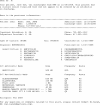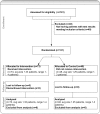Impact of automated alerts on follow-up of post-discharge microbiology results: a cluster randomized controlled trial
- PMID: 22278302
- PMCID: PMC3445692
- DOI: 10.1007/s11606-012-1986-8
Impact of automated alerts on follow-up of post-discharge microbiology results: a cluster randomized controlled trial
Abstract
Background: Failure to follow up microbiology results pending at the time of hospital discharge can delay diagnosis and treatment of important infections, harm patients, and increase the risk of litigation. Current systems to track pending tests are often inadequate.
Objective: To design, implement, and evaluate an automated system to improve follow-up of microbiology results that return after hospitalized patients are discharged.
Design: Cluster randomized controlled trial.
Subjects: Inpatient and outpatient physicians caring for adult patients hospitalized at a large academic hospital from February 2009 to June 2010 with positive and untreated or undertreated blood, urine, sputum, or cerebral spinal fluid cultures returning post-discharge.
Intervention: An automated e-mail-based system alerting inpatient and outpatient physicians to positive post-discharge culture results not adequately treated with an antibiotic at the time of discharge.
Main measures: Our primary outcome was documented follow-up of results within 3 days. Secondary outcomes included physician awareness and assessment of result urgency, impact on clinical assessments and plans, and preferred alerting scenarios.
Key results: We evaluated the follow-up of 157 post-discharge microbiology results from patients of 121 physicians. We found documented follow-up in 27/97 (28%) results in the intervention group and 8/60 (13%) in the control group [aOR 3.2, (95% CI 1.3-8.4); p=0.01]. Of all inpatient physician respondents, 32/82 (39%) were previously aware of the results, 45/77 (58%) felt the results changed their assessments and plans, 43/77 (56%) felt the results required urgent action, and 67/70 (96%) preferred alerts for current or broader scenarios.
Conclusion: Our alerting system improved the proportion of important post-discharge microbiology results with documented follow-up, though the proportion remained low. The alerts were well received and may be expanded in the future.
Figures
References
-
- Roy CL, Poon EG, Karson AS, et al. Patient safety concerns arising from test results that return after hospital discharge. Ann Intern Med. 2005;143:121–128. - PubMed
-
- Gandhi TK, Kachalia A, Thomas EJ, et al. Missed and delayed diagnoses in the ambulatory setting: a study of closed malpractice claims. Ann Intern Med. 2006;145:488–496. - PubMed
Publication types
MeSH terms
Grants and funding
LinkOut - more resources
Full Text Sources
Medical




